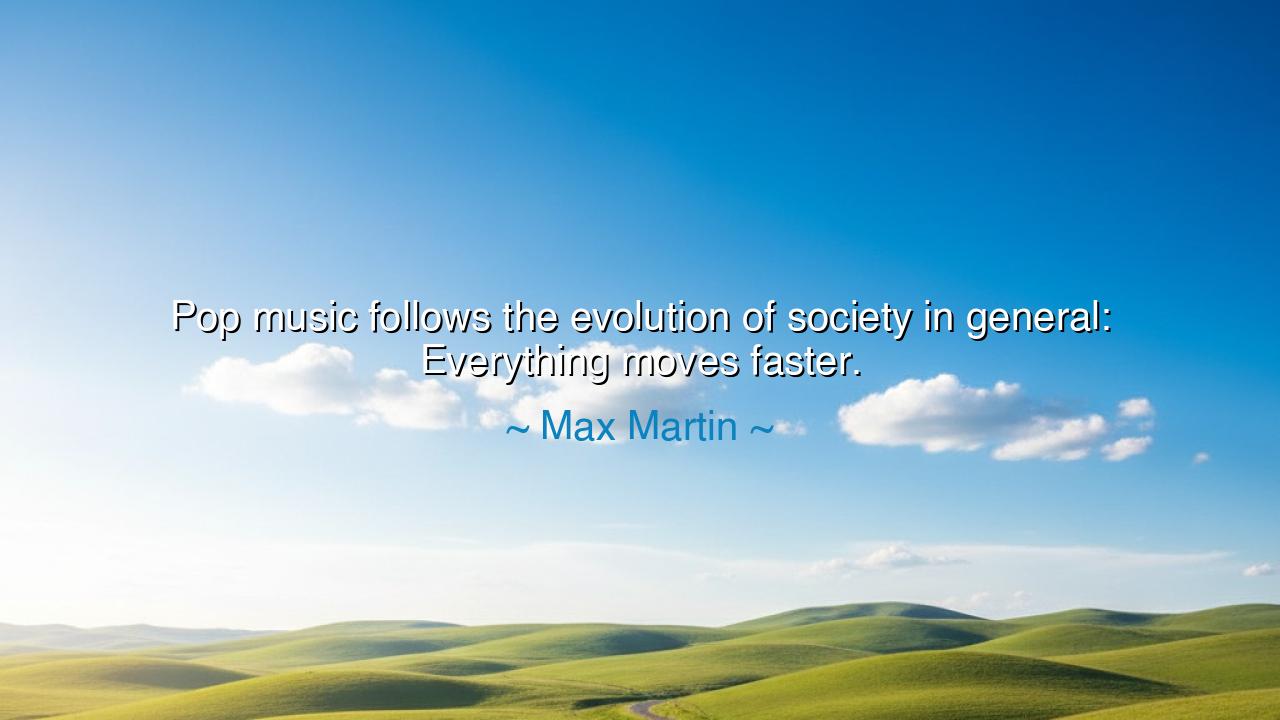
Pop music follows the evolution of society in general: Everything






Hear, O children of rhythm and memory, the words of Max Martin, a master of melodies in our age: “Pop music follows the evolution of society in general: everything moves faster.” In these words lies not only an observation of sound, but a mirror held up to the spirit of our times. For music has ever been the pulse of a people, the heartbeat of a generation. And when the heart races, when life itself hastens, so too does the music that accompanies it.
In the ancient days, songs were slow and long, sung around the fire, weaving tales that lasted through the night. The shepherd’s flute, the bard’s ballad, the hymn of the temple—all lingered like the steady rhythm of the seasons. But as the world turned, as empires rose and fell, music shifted with them. The march of the Romans echoed their legions, the chants of the monks carried the weight of eternity, and the symphonies of Europe mirrored the grandeur of nations awakening to science and industry. Thus has it always been: music reflects the evolution of society.
In our modern age, the swift rise of technology, the speed of communication, the instantaneity of desire—all these have pressed upon the soul of humanity, urging it into quicker rhythms, shorter patterns, brighter bursts of sound. Pop music, with its immediacy, its hooks, its ability to seize the ear in a moment, is the perfect child of such a world. As society grows faster, so too do its songs. The verse is shorter, the chorus strikes sooner, the beat insists with urgency, for it must keep pace with the racing minds and restless spirits of the age.
Consider the dawn of rock and roll in the 1950s. It was not born in silence, but in the surge of youth culture, of cars, radios, and jukeboxes, of a world recovering from war and moving toward a future of highways and machines. Its songs were quick, its rhythms urgent, its melodies unforgettable, for it spoke to a generation whose lives were moving more faster than those of their parents. Each shift in pop music—disco, hip-hop, electronic dance, streaming hits—has followed this pattern, a reflection of how society itself accelerates.
Yet let us not think that this speed is without cost. For while faster music thrills, energizes, and unites, it may also shorten attention, flatten depth, and make of art something consumed and forgotten. The ancients, who sang slowly, sang to remember. We, who sing quickly, sing to keep up. Max Martin’s words, though spoken lightly, carry the weight of this truth: in gaining speed, we risk losing patience; in gaining immediacy, we risk losing reflection.
The lesson, O listeners, is not to shun pop music or the swiftness of our age, but to be mindful of its meaning. Recognize that music is a compass pointing to the state of our society. When it quickens, it shows that we quicken; when it grows chaotic, it shows that we are restless. Let it teach you to ask: what pace have we set for our lives, and what have we left behind in our haste?
Therefore, embrace the gifts of the age, but also guard the treasures of the past. Let your heart delight in the faster pulse of the present, but do not forget to sit in silence with slower songs, with ancient hymns, with words that linger. For balance must be kept, lest the soul burn itself out in endless speed.
Thus remember the wisdom of Max Martin: “Pop music follows the evolution of society in general: everything moves faster.” It is a reflection, a warning, and an invitation. Hear it well, and live not as slaves to haste, but as masters of rhythm, choosing when to move with the quickened world and when to slow, to breathe, to remember.






AAdministratorAdministrator
Welcome, honored guests. Please leave a comment, we will respond soon